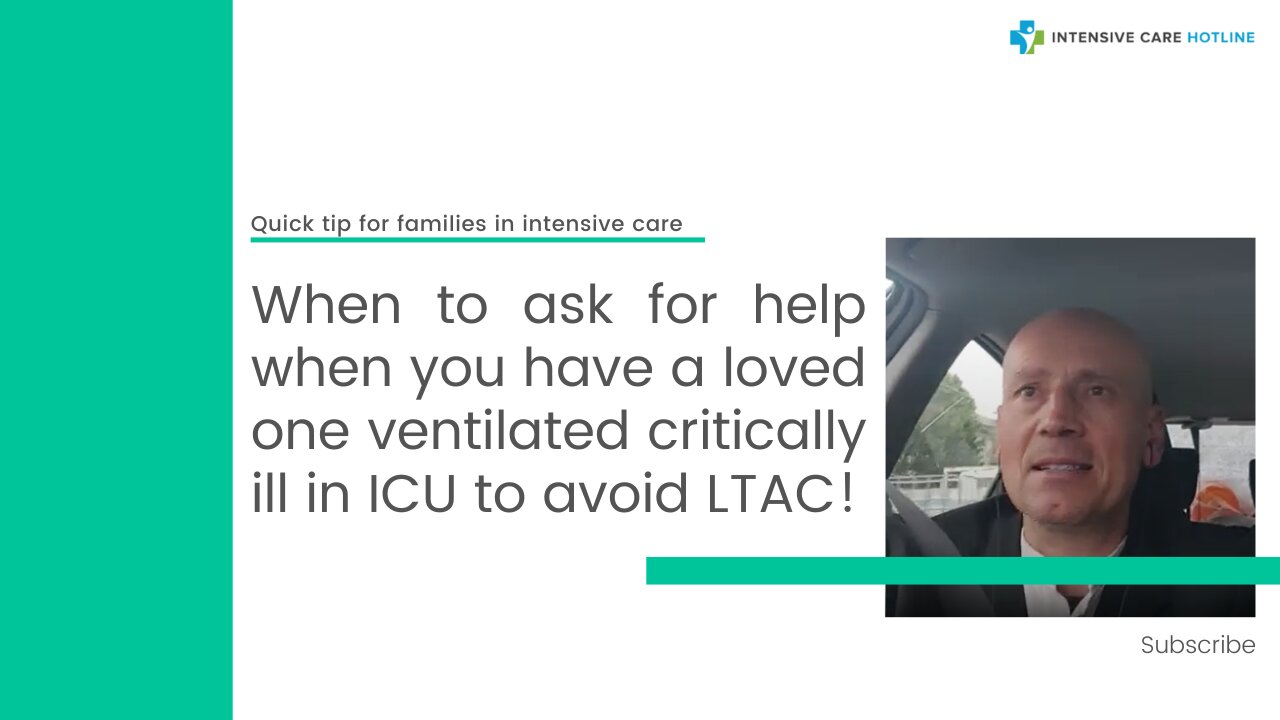Premium Only Content

When to Ask for Help When You have a Loved One Ventilated Critically Ill in ICU to Avoid LTAC!
Hi, it’s Patrik Hutzel from intensivecarehotline.com with another quick tip for families in intensive care.
So, lately, we’ve been getting a lot of phone calls from clients who are in ICU, “I have a loved one in ICU”, and the ICU is telling them they need to go to LTAC tomorrow and they didn’t see it coming. They have already given consent to a tracheostomy and the PEG (Percutaneous Endoscopic Gastrostomy) tube. Next thing they know, they’re being ambushed by the intensive care team saying, “Well, tomorrow you got to go to an LTAC facility.” Again, they don’t see it coming.
Now, can you seek advice early enough when you have a loved one in intensive care? You really can’t, especially in those situations when you don’t know what it’s coming. Like I’ve been saying for many years, the biggest challenge for families in intensive care is simply that they don’t know what they don’t know. They don’t know what to look for. They don’t know what questions to ask. They don’t know their rights and they don’t know how to manage doctors and nurses in intensive care and that is exactly what those families are facing.
They don’t know what’s coming. They have never heard of LTAC (Long Term Acute Care). They don’t know what it means. They have no idea that going there is a really bad thing and that it really could destroy their loved one’s life.
Like we have seen many, many times over the years when ICU patients go to LTAC, they deteriorate, they die, they can’t come off the ventilator, and they need to stay in ICU for as long as it takes. They often bounce back into ICU just after a couple of days after they’ve gone to LTAC. So, the list of things going wrong in those situation situations is really endless.
So, the bottom line here is you need to seek advice, Day 1. When you have a loved one in intensive care, you can’t just let things unfold what you think might be naturally because intensive care teams have their own agenda. Unless you can work out what that agenda is and you can counteract and you can ask the right questions right from the start and you can also make the right and informed decisions more importantly, right from the start, the better your end game will be, and you will have peace of mind, control, power, and influence.
One thing that you should be doing when you have a loved one in intensive care before you give consent to a tracheostomy and a PEG, has the ICU done everything beyond the shadow of a doubt to wean your loved one off the ventilator and the breathing tube and avoid the tracheostomy?
-
 0:58
0:58
Intensive Care Hotline
2 hours agoMy Mom's in ICU with Multi-Organ Failure,The ICU Team Wants to Make Her "Comfortable" To Let Her Die
31 -
 LIVE
LIVE
Graham Allen
2 hours agoWWIII INCOMING?! Biden Authorizes Strike On Russia Ahead of Trump Taking Office!!
8,994 watching -
 LIVE
LIVE
Matt Kohrs
12 hours agoTesla Pops on News, Bitcoin Pushes Higher & Nvidia Earnings || The MK Show
1,410 watching -
 35:19
35:19
BonginoReport
3 hours agoDeep State Wants WW3 Before Trump Takes Office (Ep.87) - 11/18/24
28.4K55 -
 LIVE
LIVE
Jeff Ahern
1 hour agoMonday Madness with Jeff Ahern (6am Pacific)
708 watching -
 2:00:55
2:00:55
AP4Liberty
2 hours ago $6.12 earnedMusk's Dual Role in Trump's Transition Team and Policy Influence
19.5K3 -
 6:33:53
6:33:53
MissesMaam
12 hours agoRumblers Stranded Again! | Sons of the Forest 💚✨
47K6 -
 16:03
16:03
DeVory Darkins
1 day ago $38.03 earned"Shut The F**K UP!" Charles Barkley EXPLODES As DEMS MELTDOWN over Trump
85.7K345 -
 4:44:04
4:44:04
Akademiks
13 hours agoDiddy is RUNNING The Jail! Feds Fear He's Unstoppable even behind Bars! Drake Revenge Era?
116K28 -
 5:26:52
5:26:52
Fed Reacts
11 hours agoReaction To Twitch Adpocolypse, Thots, Debating Blacks & Liberals!
76K15